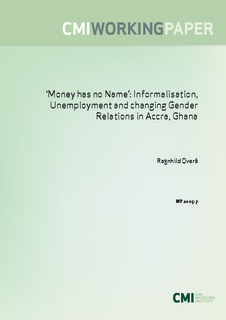| dc.contributor.author | Overå, Ragnhild | |
| dc.date.accessioned | 2008-02-20T11:50:24Z | |
| dc.date.accessioned | 2017-03-29T09:13:04Z | |
| dc.date.available | 2008-02-20T11:50:24Z | |
| dc.date.available | 2017-03-29T09:13:04Z | |
| dc.date.issued | 2005 | |
| dc.identifier.isbn | 82-8062-182-2 | |
| dc.identifier.issn | 0804-3639 | |
| dc.identifier.uri | http://hdl.handle.net/11250/2436018 | |
| dc.description.abstract | Economic crisis and structural adjustment in Ghana have put large numbers of formal sector employees and civil servants out of work. This informalisation process has gendered consequences. Unemployed people, rural-urban migrants and school-leavers of both genders seek employment in the urban informal economy, and increasingly take up occupations hitherto categorised as ‘female’ – particularly in retail trade. Overcrowding in women’s economic domains thus occurs. This study examines how informally employed men and women in Accra get by in a changing macro-economic environment, and how they accommodate but also stretch local ideologies of gender-appropriate behaviour in their economic strategies. Thus, even if female traders face competition, declining returns and a heavier dependency burden, frustration with government policies failing to create decent jobs (for men) is more prevalent than gender antagonism and ridicule of those who find gender-untypical ways of eking out a living. | |
| dc.language.iso | eng | |
| dc.publisher | Chr. Michelsen Institute | |
| dc.relation.ispartofseries | CMI Working paper | |
| dc.relation.ispartofseries | WP 2005: 7 | |
| dc.subject | Structural adjustment | |
| dc.subject | Unemployment | |
| dc.subject | Informal economy | |
| dc.subject | Gender | |
| dc.subject | Ghana | |
| dc.subject | Africa | |
| dc.title | "Money has no Name": Informalisation, Unemployment and changing Gender Relations in Accara, Ghana | |
| dc.type | Working paper | |
